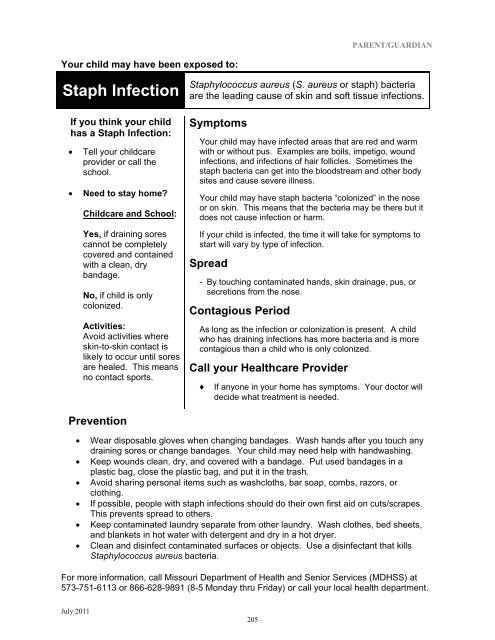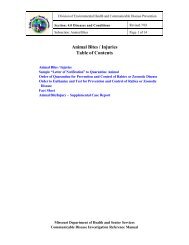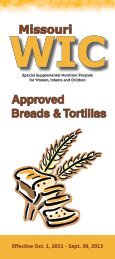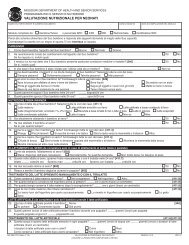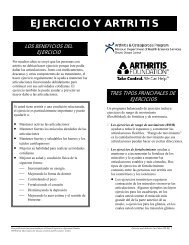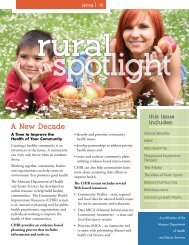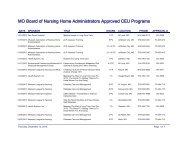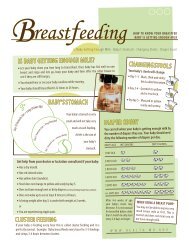Prevention and Control of Communicable Diseases - Missouri ...
Prevention and Control of Communicable Diseases - Missouri ...
Prevention and Control of Communicable Diseases - Missouri ...
Create successful ePaper yourself
Turn your PDF publications into a flip-book with our unique Google optimized e-Paper software.
Your child may have been exposed to:<br />
Staph Infection<br />
If you think your child<br />
has a Staph Infection:<br />
� Tell your childcare<br />
provider or call the<br />
school.<br />
� Need to stay home?<br />
July 2011<br />
Childcare <strong>and</strong> School:<br />
Yes, if draining sores<br />
cannot be completely<br />
covered <strong>and</strong> contained<br />
with a clean, dry<br />
b<strong>and</strong>age.<br />
No, if child is only<br />
colonized.<br />
Activities:<br />
Avoid activities where<br />
skin-to-skin contact is<br />
likely to occur until sores<br />
are healed. This means<br />
no contact sports.<br />
<strong>Prevention</strong><br />
205<br />
PARENT/GUARDIAN<br />
Staphylococcus aureus (S. aureus or staph) bacteria<br />
are the leading cause <strong>of</strong> skin <strong>and</strong> s<strong>of</strong>t tissue infections.<br />
Symptoms<br />
Your child may have infected areas that are red <strong>and</strong> warm<br />
with or without pus. Examples are boils, impetigo, wound<br />
infections, <strong>and</strong> infections <strong>of</strong> hair follicles. Sometimes the<br />
staph bacteria can get into the bloodstream <strong>and</strong> other body<br />
sites <strong>and</strong> cause severe illness.<br />
Your child may have staph bacteria “colonized” in the nose<br />
or on skin. This means that the bacteria may be there but it<br />
does not cause infection or harm.<br />
If your child is infected, the time it will take for symptoms to<br />
start will vary by type <strong>of</strong> infection.<br />
Spread<br />
- By touching contaminated h<strong>and</strong>s, skin drainage, pus, or<br />
secretions from the nose.<br />
Contagious Period<br />
As long as the infection or colonization is present. A child<br />
who has draining infections has more bacteria <strong>and</strong> is more<br />
contagious than a child who is only colonized.<br />
Call your Healthcare Provider<br />
♦ If anyone in your home has symptoms. Your doctor will<br />
decide what treatment is needed.<br />
� Wear disposable gloves when changing b<strong>and</strong>ages. Wash h<strong>and</strong>s after you touch any<br />
draining sores or change b<strong>and</strong>ages. Your child may need help with h<strong>and</strong>washing.<br />
� Keep wounds clean, dry, <strong>and</strong> covered with a b<strong>and</strong>age. Put used b<strong>and</strong>ages in a<br />
plastic bag, close the plastic bag, <strong>and</strong> put it in the trash.<br />
� Avoid sharing personal items such as washcloths, bar soap, combs, razors, or<br />
clothing.<br />
� If possible, people with staph infections should do their own first aid on cuts/scrapes.<br />
This prevents spread to others.<br />
� Keep contaminated laundry separate from other laundry. Wash clothes, bed sheets,<br />
<strong>and</strong> blankets in hot water with detergent <strong>and</strong> dry in a hot dryer.<br />
� Clean <strong>and</strong> disinfect contaminated surfaces or objects. Use a disinfectant that kills<br />
Staphylococcus aureus bacteria.<br />
For more information, call <strong>Missouri</strong> Department <strong>of</strong> Health <strong>and</strong> Senior Services (MDHSS) at<br />
573-751-6113 or 866-628-9891 (8-5 Monday thru Friday) or call your local health department.


